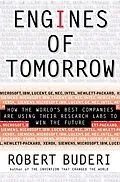The U.S. economy is the envy of the world, and the key to its success is technological innovation. In this fascinating and in-depth account reported from three continents, Robert Buderi turns the spotlight on corporate research and the management of innovation that is helping drive the economy's robust growth. Here are firsthand communiqués from inside the labs of a reborn IBM, resurgent GE and Lucent, research upstarts Intel and Microsoft, and other leading American firms -- as well as top European and Japanese competitors. It was only a few years ago that competitiveness experts -- U.S. well-wishers and naysayers alike -- concluded that America had lost its business and technological edge. The nation's companies, they asserted, couldn't match the development and manufacturing efficiency of overseas rivals. Yet now the nation is humming along, riding an unparalleled wave of innovation. Buderi tells us this turnaround has come on many fronts -- in marketing, sales, manufacturing, and the creation of start-up companies. But Engines of Tomorrow deals with a central element that has gone largely unexamined: corporate research. It's the research process that provides the technologies that spur growth. Research is behind the renaissance of IBM, the stunning growth of Lucent, and much of the steamrolling American recovery. Focusing on the fast-moving communications-computer-electronics sector, Buderi profiles some of the world's leading thinkers on innovation, talks with top inventors, and describes the exciting technologies coming down the pike -- from information appliances to electronic security and quantum computing. In the process, he examines the vital strategic issues in which central labs play a determining role, including:
- How IBM's eight labs around the world figure in Lou Gerstner's plans to achieve consistent double-digit growth -- and to join GE as a $100 billion concern.
- Why Xerox's famed Palo Alto Research Center is vying to resuscitate its company's lagging fortunes by sending anthropologists into the field to study the hidden ways people really work.
- What Hewlett-Packard will do without its original instrument business, recently spun off as Agilent Technologies. The business was central to HP Labs' MC2 philosophy of merging research expertise in measurement, computation, and communication -- and its departure removed a lot that was unique about HP.
- How the November 1999 federal court finding that Microsoft operates a monopoly hinders the Seattle giant's acquisition plans and makes it increasingly vital for nine-year-old Microsoft Research to lead the way in innovating from within. Could this be the next great lab for the twenty-first century?
Autorentext
Robert Buderi, a Fellow in MIT's Center for International Studies, is the author of two acclaimed books, Engines of Tomorrow, about corporate innovation, and The Invention That Changed the World, about a secret lab at MIT in World War II. He lives in Cambridge, Massachusetts.
Inhalt
Introduction: Change
ONE A Matter of Death and Life
TWO The Invention of Invention
THREE Houses of Magic
FOUR Out of the Plush-lined Rut
FIVE IBM: Taking the Asylum
SIX House of Siemens
SEVEN NEC: Balancing East and West
EIGHT The Pioneers: General Electric and Bell Labs
NINE Children of the Sixties: Xerox and Hewlett-Packard
TEN The New Pioneers: Intel and Microsoft
Conclusion: The Innovation Marathon
Appendix
Notes
Interviews
Bibliography
Index
